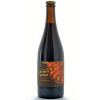Strange Roots Experimental Ales - Ancient Vortex
-
ABV:
9.2% -
Bottle Size:
750-ml -
Serving Temperature:
52–59° F -
Suggested Glassware:
Snifter, Tulip, Goblet, or Pinot Glass
We’ve enjoyed any number of great releases from the folks at Strange Roots Experimental Ales over the past few years, and we wanted to work with them on an exclusive beer for the club—something that would showcase what they’ve been working on in the realms of bigger beers and special adds. The result is Strange Roots’ Ancient Vortex: a Belgian-style dark ale brewed with raw cacao and candi sugar, and conditioned on cacao beans. The malt-forward emphasis of the quadrupel-like, Belgian-style ale leads, with potent levels of caramelization, brown sugar, and dried fruits amplified by subtle acidity and fruit. The cacao’s super smooth.
Strange Roots Ancient Vortex pours a dense, mostly opaque golden-brown, capped by light tan foam that sticks around for a good while after the initial pour. There’s definitely a bit of a reddish hue present, and this Belgian-style dark ale overall provides a reddish-brown glow when held up to the light. The foam’s persistent, leaving behind dense lacing along the edges of the glass. A dark, colorful beer with nice visual presentation overall.
Generous aromatics are present from the first pour of Ancient Vortex. Expressive caramels, burnt sugar, and plenty of dried dark fruits lead. This dark ale leans heavily on an expressive quadrupel approach, with that massively malty and creamy Belgian style forming the core framework here. The cacao throughout is a pleasant chocolate undertone. There are welcome touches of char and licorice and bitter clove, providing a nicely bitter edge to counterpoint the core malt focus. There’s also plump fruit and maybe a hint of oak underneath?—lots of cherry, strawberry, and currant. The aroma expands quite a bit with some time to warm.
Like the best Belgian-style quads, this big beer feels especially light and vibrantly textured as a whole. The first sip of Ancient Vortex offers up layered caramels and toffee, bringing forth a huge amount of darker malt character—without stepping into that full-on roast and coffee of a stout. There’s a pleasant underpinning of vinous, fruity alcohol that helps streamline the feel here as well, along with those bittering elements mentioned in the aromatics: clove, even a touch of peppery phenols, burnt sugars (think: crème brulee crust), and maybe even a hint of oak tannins. There’s a ton to dive into with this beer, and as it warmed we found all sorts of additional details: candied orange, spice cookies, hints of licorice and char and toast... It’s a brilliant beer from Strange Roots: one of the most unique quad-ish beers we’ve ever tried.
The caramelization levels on this are pretty substantial, such that we’d be inclined to go easy on cellaring this. It’s blended to be consumed on the fresher side. As far as food pairings go: the emphasis on caramel and fruit makes this feel prime for dishes using pork—say a simple bone-in chop alongside sautéed apples. For desserts, look to a creamy vanilla counterpoint.
Strange Roots Experimental Ales will be a new name to many of you, but some of our members will recall their mixed-culture Agent Orange with persimmons and apricots which we featured in 2018, or this Pennsylvania brewery’s previous name: Draai Laag Brewing Co. Dennis Hook started Draai Laag back in 2011, self-engineering an $800 brewing system and bootstrapping an operation that focused heavily on complex sour ales and bringing in local ingredients and microflora. And that small-batch, out-there approach—Draai Laag’s system at the time made only two barrels of beer at once—brought forth some amazing results, and a small amount of Draai Laag’s bottles saw wider exposure through Shelton Brothers. But as Dennis was looking to move into exploring a wider range of beer styles (and, let’s be real, we can’t consistently spell Draai Laag either), the brewery became Strange Roots in March 2018.
Rest assured, Dennis is still doing beers that are way, way out there. He’s been building his brewing capabilities for around 20 years, since he was 17 years old and his mom agreed to let him brew (as long as he wouldn’t drink any, relying on of-age neighbors for feedback)—and as Strange Roots looks to the future, he’s looking to push the envelope even further. Strange Roots recently released Grand Blu, a collab with House of 1,000 Beers that uses penicilium roqueforti, responsible for the distinct character of blue cheese, accompanied by additions of peaches and fermented in casks for 11 months. The brewery’s been surveying and testing local wild microflora for brewing possibilities, with one key highlight being their Park Series of beers—fermented with yeast and bacteria harvested from local Pittsburgh-area parks. Dennis mentioned projects with foraged pawpaw fruit and mayapples. We got to learn about fruit and other ingredients that we had no idea were growing in Pennsylvania.
Which is kind of the point. Strange Roots continues the traditions of Draai Laag while giving Dennis and company even more room to explore. We’re pumped to be able to offer an exclusive release that Strange Roots put together for the Rare Beer Club: a Belgian-style dark ale brewed with raw cacao and candi sugar, and conditioned on cacao beans. If you’re near Pittsburgh, the brewery has locations in Millvale and Gibsonia. Tell Dennis we said hey!

Unmatched Variety by style, brewery & country
Choose from Five different Beer Clubs offering unmatched variety by brewery,
country of origin, and beer style to suit your specific tastes.


